
![]()
~ THE ROYAL FOUNTAIN HOTEL ~
16 ST. MARGARET'S STREET, CANTERBURY
FOUNTAIN INN
FOUNTAIN HOTEL
Claims to have been in existence since 1029
Destroyed in the air raid bombings of June 1942, used as a parking lot up to the 1980's
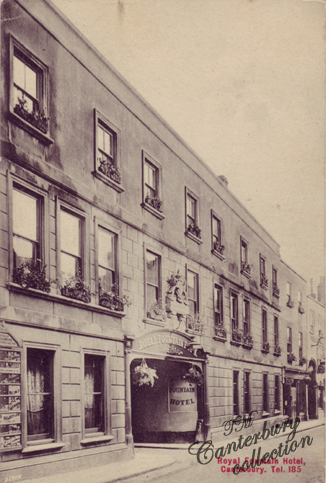
The front of the Royal Fountain Hotel, St. Margaret's street
1824 - Samuel WRIGHT, proprietor
The Entrance Lounge of the Royal Fountain Hotel, St. Margaret's street, from my collection
"Death July 2. In his 8[?]th year, Mr. John FARLEY, formerly master of the Fountain Inn at Canterbury." GM1792
"Death, November 1, 1794, in Canterbury, Mrs. FARLEY, widow of the late Mr. John FARLEY, formerly of the Fountain Inn in that city." KR1794
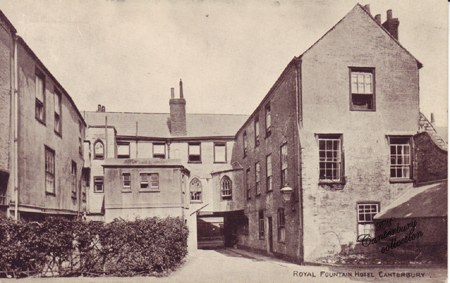
The rear of the Royal Fountain Hotel, located in St. Margaret's street - from my collection
Death, Mrs. MILES of the Fountain Inn. - The Monthly Magazine 1801 pg. 272
1802, September - Married at Canterbury, Mr. MILES, of the Fountain Inn, to Mrs. RATCLIFFE
The Main Corridor of the Royal Fountain Hotel, St. Margaret's street, from my collection
1813 death of Thomas AVELING from Picadilly London at the Fountain inn, buried at St. Margaret's Canterbury
Renamed the Fountain Hotel 1827
Royal Fountain Hotel c. 1867
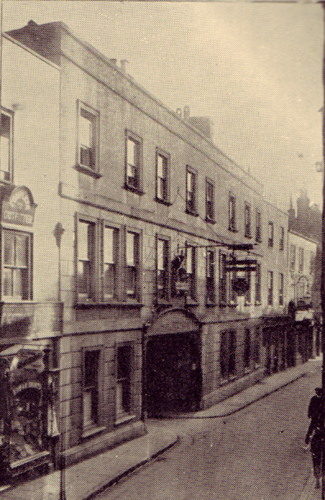
Passages from the Auto-biography of a "Man of Kent", by Robert Cowtan 1866
"The "Fountain Hotel", kept at that time by one that was always spoke of as "Sam Wright" peace to his memory was almost a little town in itself, and that worthy gentleman made a large and well earned fortune from his business. He was well known and highly respected by all the distinguished personages who visited his establishment en route to the Continent, as well as by the gentry of the surrounding neighbourhood. I was very intimate with this gentleman and his family, so that I could run in at any time. I was a special favourite with Mrs. Wright, and her only daughter presented me with my first watch and chain. I recollect watching with much admiration the graceful manner in which this "fine old English gentleman" would lift his hat, and bow to the inmates of the carriages as they left his hotel. I don't think that Simpson of Vauxhall notoriety, could have performed this salutation with more ease and grace."
A corner of the Dining Room of the Royal Fountain Hotel, St. Margaret's street, from my collection
Nov. 19 - Farewell Dinner to Gov. Farquhar. - A sumptuous banquet was given at the Fountain Tavern, Canterbury, by S. R. Lushington, Esq. the worthy representative of the city, and a large portion of the most respectable freemen and inhabitants, to their highly-esteemed brother freeman, Robert Townshend Farquhar, Esq. who is now on his return to the mauritius.
1819 The Asiatic Journal and Monthly Miscellany
*Rt. Hon. S. R. Lushinton, pension, March 1825 - £1500 - What claims can this gentleman have to a pension? Always filling lucrative offices, and now governor of Madras, for which post he deserted his twenty pound Canterbury constituents. The Black Book 1831
A lovely old luggage tag from the Royal Fountain Hotel, Canterbury - courtesy of a frequent visitor to the site (thank you)
"On the left will be seen that ancient hostelry "The Fountain" which has a good claim to being the oldest of English Hotels. It is reputed that the wife of Earl Godwin stayed at the Fountain in A.D. 1029. Archbishop Lanfranc temporarily resided here during the re-building of his Palace in 1070. There is also a legend that within its walls, the four knights arranged the last details of their plot to murder Thomas a Becket in 1170. The Hotel is rich in historic associations. General Sir Thomas Picton was entertained here on his way to join Wellington in June 1815. He fell at Waterloo, and his body was brought back to England by order of the Duke of Wellington, the remains were brought to Canterbury, and by a strange coincidence, the body of Sir Thomas Picton was placed in that very room in which he had on that day, a fortnight ago, been the guest of honour."
Text from my Pilgrims Guide to Canterbury
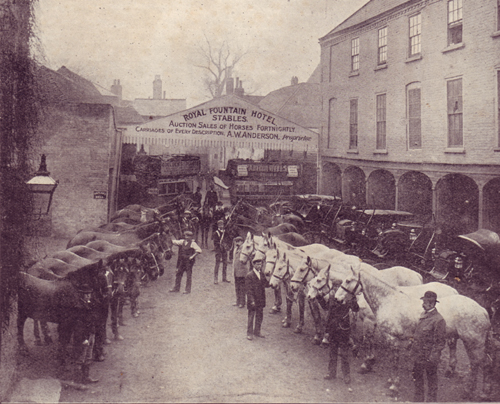
The Royal Fountain Hotel Stables
c.1902
"Their Royal Highnesses arrived at Kensington Palace to dinner, on Friday the 25th of September, on the following Monday left it again for Ramsgate; at which town, the anticipated meeting with the King and Queen of the Belgians was to take place. At about six on the same evening the illustrious travellers arrived with their suite at the Fountain Hotel, Canterbury, and were welcomed by a large concourse of persons assembled for the purpose. Soon after their arrival the Mayor summoned the Alderman and Common Councilmen of the City, in order to consult what steps should be adopted on the occasion of the royal visit. The result was that an Address was agreed upon; and a deputation appointed to wait up their Royal Highnesses, and ascertain at what time they would be pleased to receive it. The deputation had an interview at the Fountain Hotel with Sir John Conroy, and having expressed the desire of the Corporation, Sir John conferred with their Highnesses, and on his return to the deputation, stated that the Royal Party had named Tuesday morning, at half-past nine o'clock, for the audience. In the course of the same evening, Sir Brook Brydges, Bart., Captain of the Yeomanry Cavalry, offered an escort to attend their Royal Highnesses from Canterbury to Ramsgate, which offer was accepted by the Duchess of Kent, for a distance of two miles out of the town.
At eight o'clock on Tuesday morning, the Mayor and Alderman, with about twenty Common Councilmen, assembled at the Guildhall, and proceeded from thence in their robes of office, shortly after nine, to the Fountain Hotel, the bells of the numerous churches ringing merry peals. At the Hotel, the members of the Corporation were ushered into a spacious apartment, and soon after her Royal Highness the Duchess of Kent, with the Princess Victoria attended by Sir John Conroy, entered the room and J. Partridge, Esq. the Mayor, read the Address, which was engrossed on a sheet of fine vellum. The Duchess having returned a very gracious and pleasing answer, both their Royal Highnesses curtsied to the members of the Corporation, and retired to an adjoining room, where another deputation, consisting of the Archdeacon, and three of the Prebendaries of Canterbury, was in waiting to pay tribute of respect to their Royal Highnesses, and invite them to view the interior of the Cathedral. The Duchess of Kent assured the deputation that both herself and Daughter would have great pleasure in so doing; but having made arrangements to proceed to Ramsgate without delay, they would take an opportunity to make a special visit for the purpose.
The band of the 48th Regiment, stationed at Canterbury, played in front of the Fountain Hotel during the morning, and on quitting Canterbury, between ten and eleven o'clock, their Royal Highnesses were loudly cheered as they passed down the various streets on their way to Ramsgate, escorted by the Yeomanry."
Victoria the First, 1840, Simpkin & Marshall
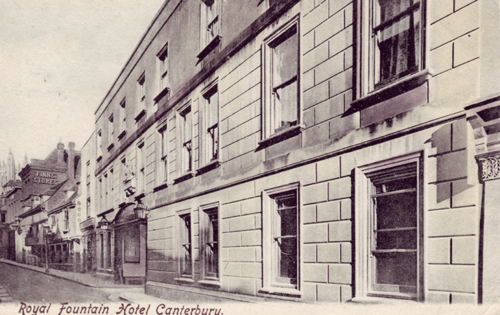
The Royal Fountain Hotel, St. Margaret's street, from my collection
A postcard from my collection, postmarked 10pm from Canterbury, July 18, 1906, to Miss Filmer Sucheffs Farm, Blean Near Canterbury "Going for walk with Mr. E. of Whitstable on Thursday, meeting him top of St. Thomas Hill will fetch him over to introduce him to you if I can he has been ill. I had an accident playing cricket."
"The horses were then put in and her majesty proceeded on her journey to Canterbury. When her majesty reached this city it was nearly dark. The scene, however, became singularly beautiful from the effect of 100 flambeaux, which were lighted at the entrance of the city, and carried by men. This illumination discovered upwards of ten thousand persons, who were anxiously expecting her majesty's approach, and who, the moment they caught sight of her carriage, gave three cheers, and continued to cry "Long live Queen Caroline!" The horses were taken from the carriage, and her majesty was drawn through the main street by the multitude. On reaching the house of the mayor, the crowd stopped, and renewed their cheers. Her majesty reached the Fountain-Hotel at nine-o'clock, and immediately alighted amidst continued testimonies of attachment. The mayor and corporation were in waiting to present an address. They were attired in their corporation dresses. They were immediately received by her majesty in the same form as the deputation of the inhabitants of Dover. The mayor then read in a distinct voice an address, of which the following is a copy: "We, his majesty's dutiful and loyal subjects, the mayor, aldermen, sheriff, and common councilmen of the ancient city of Canterbury, beg leave most respectfully to approach your royal presence with our sincere and hearty congratulations on your majesty's safe arrival in this city; and to express our fervent hope, that your majesty may long live in the esteem and admiration of a loyal and dutiful people." June 5th, 1820. Her majesty immediately delivered the following most gracious answer: "Gentlemen - I am very much obliged to you for the attention you showed me, and certainly, if it is ever in my power, I shall be happy to do any thing for the good town of Canterbury, and to make my people happy. Gentlemen, you must excuse this short address, as I am very tired; but I speak from my heart, and I am sure you will like that better than a formal address. I shall never forget the loyalty and affection that are shown to the house of Brunswick by this noble and generous nation." Her majesty retired early to her bed-chamber. Next morning her majesty rose at nine, and set out on her journey to London at half-past ten. The morning was extremely unfavourable, from a continued fall of rain. The people would not permit the horses to be put to the carriage, but insisted upon drawing her majesty completely through the town. The ladies were everywhere seen waving their handkerchiefs, and joining in the general exclamations of "Long live our gracious Queen." Her majesty repeatedly put her head out of the window to those who pressed to gain a view of her countenance. She also waved her handkerchief, and calling on the people to respect their king, cried "Long live King George the Fourth!" A great many of the young officers of the cavalry regiment stationed at Canterbury accompanied her majesty on horseback, from Canterbury to Sittingbourn."
History, Politics and Literature of the year 1820, prnt 1822
Nim South's Tour - "The George at Melton, the Bell at Leicester, Deakin's at Bicester, the Sun at Lyndhurst, the Albion at Brighton, the Fountain at Canterbury, Johnson's at Crawley and the White Horse at Romsey, are the only inns at which I remember every getting really good wine, and I have been in scores upon scores."
The New Sporting Magazine, November 1832, vol.IV no. 19
(crest)
By Special Appointment.
ROYAL FOUNTAIN HOTEL
CANTERBURY.
-------------------------------
This Old-Established Family Hotel is replete with every comfort
and accommodation, and at moderate charges.
Orders by Post or Telegram strictly attended to.
-------------------------------
WILLIAM FINN,
PROPRIETOR.
------------------------------
Neat Flys and Post Horses.
1860 Ad (John Brent)
1860 - William Finn *noted in "The Draper and Clothier" A book of general information for all traders in and purchasers of textile fabrics 1860
1860's - 1882 - William Finn
April 22, 1882, Mr. Finn Deceased, Royal Fountain Hotel Canterbury (Kentish Express and Ashford News)
1884 - 1890's - Horatio Ward *Horatio was a Freemason
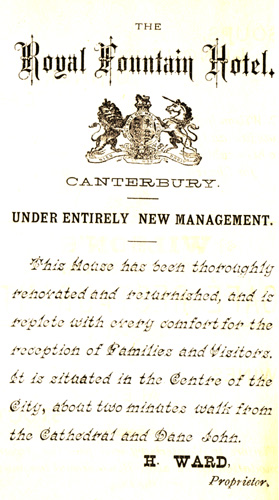
Ad from my Goulden's Guide c. 1895
1903 - Mrs. A. Spark
AD in my 1922 directory
F.C. Large, Proprietor "The oldest first class Family Hotel in the City" Re-decorated throughout. Table D'Hote, Luncheons & Dinners, Spacious Lounge and Dining Room. Electric Light. Free Garage.
1929 directory - F.C. Large, Proprietor
1934 - F. C. Large, Proprietor
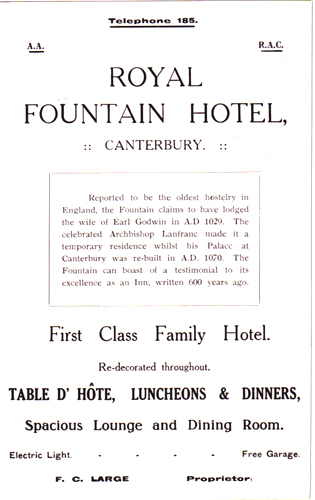
ROYAL FOUNTAIN HOTEL, Canterbury "The Oldest Hostelry in England" c. 1930 by T.W. Armes, guidebook and adverts, Mr. F.C. LARGE, proprietor